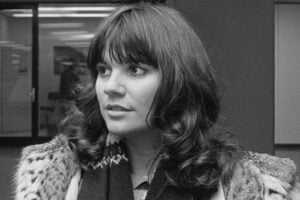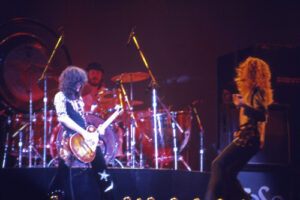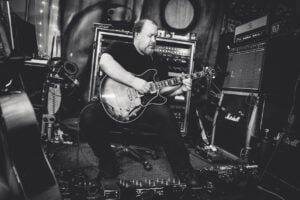
Feature Photo: Mewhen123, CC BY 2.0 <https://creativecommons.org/licenses/by/2.0>, via Wikimedia Commons
From the maritime shores of Nova Scotia emerged a rock band that would become one of Canada’s most enduring musical exports, selling over 20 million albums worldwide across a career spanning more than five decades. April Wine formed in December 1969 when vocalist and guitarist Myles Goodwyn joined forces with the Henman brothers in Waverley, Nova Scotia. The band’s original lineup featured Myles Goodwyn on vocals, guitar and keyboards, David Henman on guitar and vocals, Ritchie Henman on drums, and Jimmy Henman on bass and vocals.
The band has released 16 studio albums and over 40 total releases throughout their career, achieving multiple platinum certifications and becoming the first Canadian band to be featured on MTV. April Wine reached their commercial peak with 1981’s “The Nature of the Beast” album, which climbed to number 24 on the Billboard 200 chart and spawned the hit single “Just Between You and Me” that reached number 21 in the United States. The band experienced an eight-year hiatus from 1984 to 1992 before reuniting and continuing to tour and record new material.
April Wine has undergone numerous lineup changes throughout their history, with 18 official members contributing to the band’s evolution across five distinct eras. The group achieved particular success during their classic three-guitar lineup period from 1977 to 1984, which produced their most commercially successful albums. Following the death of founding member Myles Goodwyn in December 2023, the band continues to tour with Brian Greenway serving as their longest-tenured member at 48 years of service.
Myles Goodwyn
Myles Goodwyn served as April Wine’s founding member, primary songwriter, lead vocalist, and creative director from the band’s formation in December 1969 until his retirement from touring in December 2022. Born in Woodstock, New Brunswick, Goodwyn joined the Henman brothers in late 1969 to form what would become April Wine. He appeared on every studio album from their 1971 self-titled debut through 2006’s “Roughly Speaking,” contributing vocals, guitar, keyboards, and the majority of the band’s songwriting. His distinctive voice and melodic sensibilities defined April Wine’s sound across multiple decades and lineup changes.
Goodwyn’s contributions to individual albums showcase his versatility and growth as a songwriter. On early releases like “April Wine” and “On Record,” he shared vocal duties with Jim Henman while establishing the band’s folk-rock foundation. His songwriting matured significantly by “Electric Jewels” in 1973, where tracks like “Weeping Widow” demonstrated his ability to craft both tender ballads and driving rock anthems. The peak period albums “First Glance,” “Harder Faster,” and “The Nature of the Beast” featured Goodwyn’s most commercially successful compositions, including “Roller,” “I Like to Rock,” and “Just Between You and Me.”
Beyond April Wine, Goodwyn maintained an active solo career that earned him multiple awards and recognition as a blues artist. His solo albums “Myles Goodwyn and Friends of the Blues” won East Coast Music Awards in both 2018 and 2019, while also earning a Juno Award nomination. He authored two books including the memoir “Just Between You and Me” in 2016 and the novel “Elvis and Tiger” in 2018. Goodwyn was also known for his charitable work supporting homeless initiatives and diabetes research. His final performance with April Wine occurred on March 2, 2023, in Truro, Nova Scotia, with original member Jim Henman making a guest appearance. Goodwyn passed away on December 3, 2023, at age 75, concluding a 54-year tenure as the band’s driving creative force.
David Henman
David Henman served as April Wine’s original lead guitarist and co-vocalist from the band’s formation in December 1969 until his departure in September 1973. Along with his brothers Ritchie and Jimmy, David had previously performed in a band called Prism in St. John’s, Newfoundland, before relocating to Nova Scotia where they encountered Myles Goodwyn. His guitar work and harmonies were integral to April Wine’s early folk-rock sound, and he shared lead vocal duties with Goodwyn and his brother Jimmy on the band’s first three albums.
David’s guitar contributions defined April Wine’s early recordings, particularly on their 1971 self-titled debut album where his acoustic and electric work provided the melodic foundation for songs like “Fast Train” and “The Band Has Just Begun.” On 1972’s “On Record,” his guitar arrangements became more sophisticated, incorporating both rhythm and lead elements that complemented Goodwyn’s developing songwriting style. His final album with the band, 1973’s “Electric Jewels,” showcased his evolution toward a harder rock approach, though creative differences and tour fatigue led to his decision to leave the band alongside his brother Ritchie.
After leaving April Wine, David Henman largely withdrew from the music industry, choosing to pursue other interests rather than continue performing professionally. Unlike some former band members who maintained connections to the music world, David opted for a more private life away from the spotlight. His brief but important tenure helped establish April Wine’s musical foundation during their formative years, and his guitar work remains an essential part of their early catalog that launched their eventual international success.
Ritchie Henman
Ritchie Henman served as April Wine’s original drummer from December 1969 through September 1973, providing the rhythmic foundation for the band’s first three studio albums. As the middle Henman brother, Ritchie had performed with David and Jimmy in their previous band Prism before joining forces with Myles Goodwyn to create April Wine. His drumming style blended folk-rock sensibilities with an emerging harder edge that would influence the band’s musical direction during their early development years.
Ritchie’s drumming appears on April Wine’s foundational recordings, beginning with their 1971 self-titled debut where his steady, melodic approach supported the band’s acoustic-influenced material. His work on 1972’s “On Record” demonstrated increased complexity and power as the band began incorporating more electric elements into their sound. On 1973’s “Electric Jewels,” his final album with April Wine, Ritchie’s drumming showed the influence of harder rock styles that would later be fully realized by his replacement Jerry Mercer.
Following his departure from April Wine in September 1973, Ritchie Henman continued his involvement in music through various projects with his brothers. He participated in The Dudes during the late 1970s, a band that also featured Brian Greenway before the guitarist joined April Wine permanently. Ritchie made a special guest appearance during Myles Goodwyn’s final performance with April Wine on March 2, 2023, in Truro, Nova Scotia, bringing the band’s history full circle as one of its founding members honored the conclusion of the Goodwyn era.
Jimmy Henman
Jimmy Henman served as April Wine’s original bassist and co-lead vocalist from December 1969 until October 1971, appearing on the band’s first two studio albums. As the youngest Henman brother, Jimmy brought a melodic bass style and strong vocal abilities that complemented Myles Goodwyn’s emerging songwriting. His departure to pursue college education marked the first significant lineup change in April Wine’s history and set a precedent for the band’s ability to evolve through member transitions.
Jimmy’s bass work and vocals were prominent features on April Wine’s 1971 self-titled debut album, where he shared lead vocal duties with Goodwyn on several tracks including “Fast Train” and “The Band Has Just Begun.” His melodic bass lines provided the foundation for the band’s folk-influenced early sound while his harmonies added depth to their vocal arrangements. On 1972’s “On Record,” Jimmy’s contributions showed increased confidence and sophistication as the band’s sound began evolving toward a more rock-oriented approach.
After leaving April Wine to focus on his education, Jimmy Henman maintained connections to the music world through various projects with his brothers and occasional reunion activities. He participated in The Dudes during the late 1970s alongside David and Ritchie Henman, and later made guest appearances at April Wine events and tribute concerts. His most notable recent appearance occurred during Myles Goodwyn’s final performance with April Wine on March 2, 2023, in Truro, Nova Scotia, where he joined the band onstage as a symbolic acknowledgment of their shared history and the conclusion of the founding era.
Jim Clench
Jim Clench joined April Wine as bassist and co-lead vocalist in October 1971, replacing Jimmy Henman and serving two separate tenures with the band that totaled nearly two decades of contributions. His first period lasted from 1971 to 1975, during which he appeared on three studio albums and helped transition the band from folk-rock toward a harder sound. Clench returned for April Wine’s reunion era from 1992 to 2006, participating in five additional studio albums and numerous tours that reestablished the band’s presence in the music industry.
During his initial tenure, Clench’s powerful vocals and rock-oriented bass style immediately impacted April Wine’s sound. His lead vocals on “Electric Jewels” tracks like “Weeping Widow” and “Lady Run, Lady Hide” demonstrated his ability to handle both tender ballads and driving rock anthems. On 1974’s “Stand Back,” Clench’s bass work and vocals became more prominent as the band embraced a heavier approach. His contributions to 1975’s “The Whole World’s Goin’ Crazy” included the powerful vocal performance on “I Wouldn’t Want to Lose Your Love” before his departure to join Bachman-Turner Overdrive.
Between his April Wine tenures, Clench achieved significant success as bassist and vocalist for Bachman-Turner Overdrive from 1977 to 1979, appearing on albums “Street Action” and “Rock ‘n’ Roll Nights” during the band’s post-Randy Bachman era. He also contributed bass work to Bryan Adams’ debut album and maintained an active session career. Upon returning to April Wine in 1992, Clench’s experience and musical maturity helped anchor the reunion lineup through albums “Attitude,” “Frigate,” “Back to the Mansion,” and “Roughly Speaking.” His final departure in 2006 ended one of the longest and most influential tenures in April Wine’s history.
Gary Moffet
Gary Moffet served as April Wine’s lead guitarist from September 1973 to July 1984, contributing to the band’s evolution from folk-rock to arena rock during their most commercially successful period. Replacing David Henman, Moffet brought a harder-edged guitar style and arrangement skills that helped define April Wine’s classic sound. His 11-year tenure included participation in eight studio albums and numerous tours that established the band as international headliners and pioneers of Canadian rock music’s global expansion.
Moffet’s guitar work first appeared on April Wine’s 1974 album “Stand Back,” where his more aggressive approach immediately distinguished him from his predecessor. His contributions to 1975’s “The Whole World’s Goin’ Crazy” included memorable solos and rhythm work that supported the band’s transition to a harder rock sound. The peak of Moffet’s recorded output occurred during the three-guitar era beginning in 1977, when his interplay with Myles Goodwyn and Brian Greenway created April Wine’s signature sound on albums like “First Glance,” “Harder Faster,” and “The Nature of the Beast.”
Moffet’s arrangement and production skills proved particularly valuable during April Wine’s peak commercial period. His input on “The Nature of the Beast” helped create the band’s most successful album, with his guitar work on tracks like “Just Between You and Me” and “Sign of the Gypsy Queen” demonstrating his melodic sensibilities alongside technical proficiency. After April Wine’s 1984 dissolution, Moffet initially declined participation in their 1992 reunion, effectively ending his association with the band. However, he later reconnected with former bandmates through Brian Greenway’s blues projects, maintaining friendships forged during their most successful collaborative period.
Jerry Mercer
Jerry Mercer joined April Wine as drummer in September 1973, replacing Ritchie Henman and serving until his retirement in 2008 during a tenure that spanned the band’s most successful decades. Mercer brought extensive experience from his previous success with Mashmakhan, whose international hit “As the Years Go By” had established him as one of Canada’s premier rock drummers. His powerful, driving style provided the rhythmic foundation for April Wine’s transition from folk-rock to arena rock and became an integral element of their classic sound.
Mercer’s drumming immediately transformed April Wine’s sound beginning with 1974’s “Stand Back,” where his powerful approach supported the band’s embrace of harder rock styles. His work on subsequent albums “The Whole World’s Goin’ Crazy,” “Forever for Now,” and “First Glance” demonstrated his ability to adapt his style to various musical approaches while maintaining the driving energy that became his trademark. During the classic three-guitar era, Mercer’s drumming on “Harder Faster” and “The Nature of the Beast” provided the foundation for April Wine’s most commercially successful period, with his work on hits like “I Like to Rock” and “Just Between You and Me” showcasing his arena rock expertise.
Beyond his April Wine contributions, Mercer’s career highlights included his pre-band success with Mashmakhan, who achieved international recognition and participated in the legendary Festival Express tour alongside Grateful Dead, Janis Joplin, and The Band. His influence extended to mentoring younger drummers, including a notable friendship with Rush’s Neil Peart who acknowledged Mercer’s impact on his own development. Mercer also co-founded Monolith/Solstice Drums, demonstrating his entrepreneurial interests alongside his performing career. After retiring from touring in 2008, Mercer remained connected to the music community while enjoying a well-earned retirement from the demanding schedule of professional rock music.
Steve Lang
Steve Lang served as April Wine’s bassist from 1975 to 1984, contributing to nine years of the band’s most commercially successful period including their peak achievements in both Canadian and American markets. Replacing Jim Clench, Lang brought a rock-oriented bass style that complemented the band’s evolution toward arena rock during the late 1970s and early 1980s. His tenure included participation in six studio albums and extensive touring that established April Wine as international headliners capable of selling out major venues across North America.
Lang’s bass work first appeared on April Wine’s 1976 album “Forever for Now,” where his heavier approach supported the band’s continued movement away from their folk-rock origins. His contributions to 1978’s “First Glance” helped create the band’s first American gold record, with his rhythmic foundation supporting the three-guitar attack that became April Wine’s signature sound. The peak of Lang’s recorded output occurred on 1981’s “The Nature of the Beast,” where his bass work on tracks like “Just Between You and Me” and “Sign of the Gypsy Queen” demonstrated his ability to provide both melodic support and driving rhythm for the band’s most successful compositions.
Throughout his tenure with April Wine, Lang maintained a lower public profile compared to the band’s guitarists while providing essential rhythmic stability during their most active touring period. His bass work supported the band through their breakthrough into American markets and their emergence as arena headliners capable of competing with international rock acts. Lang’s departure in 1984 coincided with the band’s temporary dissolution, ending his participation during what many consider April Wine’s creative and commercial peak. His contributions during this crucial period helped establish the rhythmic foundation that supported the band’s most enduring and popular material.
Brian Greenway
Brian Greenway joined April Wine in August 1977 and continues as their longest-serving member with 48 years of contributions spanning the band’s classic era, reunion period, and current incarnation. Originally recruited to create a three-guitar attack alongside Myles Goodwyn and Gary Moffet, Greenway’s addition marked the beginning of April Wine’s most commercially successful period. His versatility as a guitarist, vocalist, harmonica player, and arranger has made him an indispensable element of the band’s sound across multiple decades and lineup changes.
Greenway’s first recorded contributions appeared on 1978’s “First Glance,” where his guitar work, harmonica, and backing vocals immediately enhanced April Wine’s sonic palette. His interplay with Goodwyn and Moffet created the three-guitar sound that defined classics like “Roller” and “Rock ‘n’ Roll Is a Vicious Game.” On subsequent albums “Harder Faster,” “The Nature of the Beast,” and “Power Play,” Greenway’s contributions expanded to include slide guitar work, additional lead vocals, and arrangement input that helped create some of April Wine’s most enduring songs including “I Like to Rock” and “Just Between You and Me.”
Prior to joining April Wine, Greenway had achieved success with Mashmakhan and later formed The Dudes with the original Henman brothers, creating connections within the Canadian rock community that would influence his entire career. During April Wine’s 1984-1992 hiatus, he released a solo album “Serious Business” that maintained the band’s musical approach while exploring blues influences that would later inform his Brian Greenway’s Blues Bus project. His current role as April Wine’s institutional memory and unofficial musical director reflects his deep understanding of the band’s catalog and his ability to mentor newer members while preserving the essential elements that define their sound. Greenway’s longevity and adaptability have made him the connecting thread between April Wine’s classic era and their continued activity as a touring and recording entity.
Steve Segal
Steve Segal served as April Wine’s guitarist from 1992 to 1995 during the band’s initial reunion period, contributing to their return to active recording and touring after an eight-year hiatus. A Montreal-based session musician with extensive experience in the Canadian music industry, Segal brought professional polish and fresh perspectives to the reunited lineup while maintaining the three-guitar approach that had defined April Wine’s classic sound. His tenure bridged the gap between the band’s peak commercial period and their later evolution as a touring entity focused on preserving their musical legacy.
Segal’s guitar work appeared on April Wine’s reunion albums “Attitude” (1993) and “Frigate” (1994), where his contributions helped reestablish the band’s presence in the music industry. His playing style complemented the returning members Myles Goodwyn, Brian Greenway, Jim Clench, and Jerry Mercer while adding contemporary elements that updated April Wine’s sound for the 1990s. On tracks like “Won’t Give Up Easy” and “If You See Kay,” Segal’s guitar work demonstrated his ability to honor the band’s established style while contributing his own musical personality to their evolving catalog.
Beyond his April Wine contributions, Segal maintained an active career as a session musician and performer throughout the Montreal music scene, working with various artists and projects that showcased his versatility across multiple genres. His departure from April Wine in 1995 was described as amicable, with the decision based on his desire to pursue other musical opportunities rather than any creative conflicts. Segal’s professional approach and musical contributions during a crucial transitional period helped April Wine successfully navigate their return to active status while maintaining the quality and integrity that had established their reputation during their peak years.
Breen LeBoeuf
Breen LeBoeuf served as April Wine’s bassist from 2007 to 2011, contributing during a period of significant transition as the band adapted to membership changes while maintaining their touring schedule and commitment to their extensive catalog. Replacing Jim Clench after his final departure in 2006, LeBoeuf brought professional experience and musical versatility that helped stabilize the rhythm section during Jerry Mercer’s final years with the band. His four-year tenure provided continuity during a period when April Wine was establishing their identity as a legacy act committed to preserving their musical heritage.
LeBoeuf’s bass work supported April Wine through extensive touring that showcased their classic material while maintaining the energy and professionalism that audiences expected from their live performances. His contributions to the band’s rhythm section helped bridge the gap between the Clench era and the subsequent addition of Richard Lanthier, ensuring that April Wine’s live presentations maintained their quality and impact. During his tenure, LeBoeuf worked closely with Jerry Mercer to provide the rhythmic foundation that supported Myles Goodwyn and Brian Greenway’s guitar work and vocals.
Throughout his time with April Wine, LeBoeuf maintained a professional approach that emphasized supporting the band’s established material rather than pushing for significant musical changes or personal recognition. His understanding of his role as a supporting member during a transitional period reflected the professionalism and musical maturity that helped April Wine continue their activities despite the challenges of maintaining an active band with a decades-spanning catalog. LeBoeuf’s departure in 2011 was handled amicably, with his contributions acknowledged as an important part of April Wine’s ability to maintain their touring activities during a crucial period of evolution and adaptation.
Blair Mackay
Blair Mackay served as April Wine’s drummer from 2009 to 2012, replacing Jerry Mercer after the legendary drummer’s retirement from touring. Mackay faced the challenging task of filling the position held by one of Canada’s most respected rock drummers while maintaining the power and precision that audiences expected from April Wine’s live performances. His three-year tenure helped the band transition from the Mercer era while preserving the driving rhythmic foundation that had been essential to their sound since 1973.
Mackay’s drumming supported April Wine through extensive touring that celebrated their classic catalog while introducing his own rhythmic personality to songs that had been defined by Mercer’s style for over three decades. His approach balanced respect for the established arrangements with his own musical perspective, creating performances that honored the original recordings while reflecting the energy of a new generation of musicians. During his tenure, Mackay worked closely with bassist Breen LeBoeuf to establish a rhythm section that could support the continuing musical partnership of Myles Goodwyn and Brian Greenway.
The challenges of replacing such an established and influential drummer required Mackay to demonstrate both technical proficiency and understanding of April Wine’s extensive catalog spanning four decades of recordings. His professional approach and dedication to serving the music rather than pursuing personal recognition helped April Wine maintain their reputation for quality live performances during a significant transitional period. Mackay’s departure in 2012 concluded his role in helping April Wine successfully navigate the post-Mercer era while establishing the foundation for their continued evolution as an active touring entity.
Richard Lanthier
Richard Lanthier joined April Wine as bassist in 2011 and continues in that role as part of the band’s current touring lineup. Replacing Breen LeBoeuf, Lanthier brought extensive experience from the Canadian music scene and a deep understanding of April Wine’s catalog that has made him an integral part of their ongoing activities. His tenure spans the final years of the Myles Goodwyn era through the current period under Marc Parent’s vocal leadership, demonstrating his adaptability and musical versatility across different phases of the band’s evolution.
Lanthier’s bass work has supported April Wine through hundreds of live performances that showcase their five-decade catalog while maintaining the energy and professionalism that audiences expect from their concerts. His rhythmic foundation has proven essential during the band’s recent transitions, providing stability as they adapted to new vocal leadership while preserving the musical elements that define their sound. During his collaboration with drummer Roy Nichol, Lanthier has helped establish a rhythm section that honors April Wine’s heritage while supporting their continued development as a live performing entity.
Throughout his tenure with April Wine, Lanthier has demonstrated the professionalism and musical understanding necessary to serve a band with such an extensive and beloved catalog. His ability to perform material spanning from the early 1970s through recent compositions reflects both his technical skills and his commitment to preserving the integrity of songs that hold special meaning for audiences across multiple generations. Lanthier’s ongoing contributions as part of April Wine’s current lineup position him as an important figure in the band’s continued evolution and their efforts to maintain their musical legacy through live performance and potential future recordings.
Roy “Nip” Nichol
Roy “Nip” Nichol joined April Wine as drummer in 2012 and continues as part of their current touring lineup, providing the rhythmic foundation for the band’s ongoing live performances and their adaptation to leadership changes following Myles Goodwyn’s retirement. Replacing Blair Mackay, Nichol brought his own musical experience and understanding of April Wine’s extensive catalog, helping to maintain the energy and precision that audiences expect from their concerts. His tenure includes the transition from the Goodwyn era through the current period under Marc Parent’s vocal leadership.
Nichol’s drumming has supported April Wine through extensive touring that celebrates their classic material while adapting to evolving lineups and musical approaches. His work with bassist Richard Lanthier has established a rhythm section capable of supporting both the veteran Brian Greenway and newer addition Marc Parent, creating a foundation that honors the band’s heritage while allowing for continued development. During his tenure, Nichol has demonstrated his ability to handle material spanning five decades of April Wine’s recordings, from their early folk-influenced pieces through their arena rock classics.
The consistency and professionalism that Nichol brings to April Wine’s rhythm section has proven essential during a period of significant transition within the band. His drumming style balances power and precision while supporting the melodic elements that have always been central to April Wine’s appeal. As part of the current lineup, Nichol continues to contribute to April Wine’s efforts to preserve their musical legacy through live performance while potentially supporting future recording projects that maintain their standards for quality and musical integrity.
Carl Dixon
Carl Dixon served as April Wine’s touring vocalist and guitarist during specific periods when additional support was needed for live performances, though he was never an official recording member of the band. His primary association with April Wine occurred during the 2000s when his powerful vocals and guitar skills made him a valuable addition to their live lineup for selected tours and performances. Dixon’s involvement with April Wine represented one element of his diverse career that spans multiple successful bands and musical projects across several decades.
Dixon’s main career achievements center on his role as vocalist and guitarist for Coney Hatch, the Toronto-based hard rock band that achieved significant success during the early 1980s. Coney Hatch’s self-titled debut album and subsequent releases established Dixon as one of Canada’s premier rock vocalists, leading to extensive touring opportunities including support slots with Iron Maiden and Judas Priest. His powerful vocal range and dynamic stage presence made Coney Hatch a formidable live act and helped establish them as important contributors to Canada’s heavy rock scene.
Beyond his primary musical career, Dixon has achieved recognition as a motivational speaker following his remarkable recovery from a severe car accident that threatened to end his performing career. His inspirational story of perseverance and rehabilitation has made him a sought-after speaker for various organizations and events. Dixon has also contributed his talents to The Guess Who during certain periods, demonstrating his versatility and respect within the Canadian rock community. His occasional associations with April Wine reflect the interconnected nature of Canada’s rock music scene and the mutual respect among musicians who have contributed to the country’s musical heritage.
Marc Parent
Marc Parent joined April Wine as lead vocalist and guitarist in 2023, assuming the challenging role of replacing founding member Myles Goodwyn following his retirement from touring due to health issues. Parent brings decades of professional experience from his success with Eight Seconds, whose single “Kiss You (When It’s Dangerous)” reached number one on Canadian charts, through his leadership of Wang Dang Doodle blues band and extensive international session work. His multilingual capabilities and formal music education provide new dimensions to April Wine’s current incarnation while respecting the legacy established over five decades.
Parent’s musical background encompasses both commercial success and artistic exploration, making him uniquely qualified to honor April Wine’s extensive catalog while potentially contributing to future developments. His experience with Eight Seconds demonstrated his ability to connect with mainstream audiences, while his blues work with Wang Dang Doodle showed his understanding of the musical roots that influenced April Wine’s development. Additionally, his international session work across Africa and Asia reflects a global perspective that brings fresh energy to a band with a primarily North American focus throughout their history.
The transition to Parent’s vocal leadership represents April Wine’s commitment to continuing as an active performing entity while preserving the musical elements that have defined their appeal across multiple generations of fans. His collaboration with longtime member Brian Greenway, bassist Richard Lanthier, and drummer Roy Nichol creates a lineup that balances institutional knowledge with contemporary energy. Parent’s acceptance of the responsibility to carry forward April Wine’s musical legacy demonstrates both his confidence in his abilities and his respect for the band’s significant place in Canadian rock history. His tenure with April Wine positions him to potentially influence their future direction while maintaining the quality and integrity that established their enduring reputation.
Check out more April Wine articles on ClassicRockHistory.com Just click on any of the links below……
Top 10 April Wine Albums
Complete List Of April Wine Albums And Discography
Read More: Artists’ Interviews Directory At ClassicRockHistory.com
Read More: Classic Rock Bands List And Directory



































